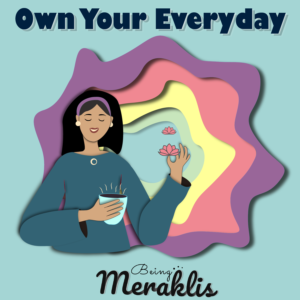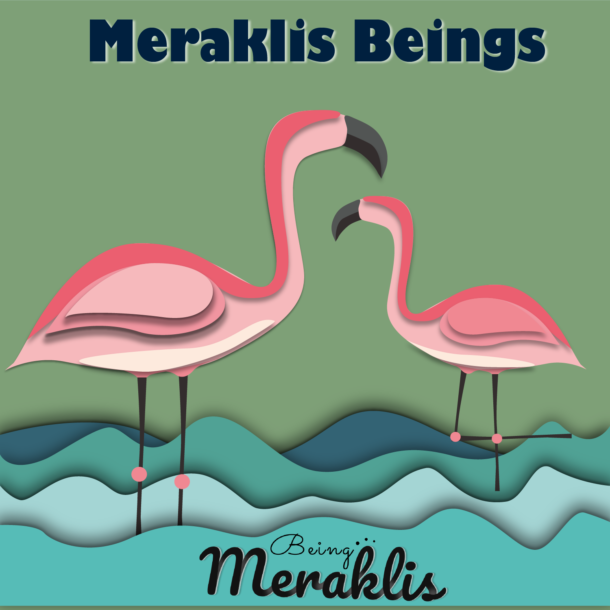Ep 109 – How to deal with information fatigue?

Have you woken up from a hellish nightmare in the middle of the night? Where nothing extraordinary happens a nightmare that just consists of bits and blobs from the numerous pieces of abstract information you consumed over the day that are put together in some ungodly fashion making you wake up in a sweat.
It is just an average night’s sleep after a regular weekday that involved some work, social media, meetings, Netflix, and of course lots of caffeine.
Have you observed just how much information we consume without our full awareness? Do you feel overwhelmed by the sheer amount of information consumed every single day? Does it leave you feeling saturated or energised to do more?
Hello and welcome to a new episode of the Own Your Everyday series. I’m your host and self-awareness coach Shwetha Sivaraman. In today’s episode, we discuss information overload in today’s internet-first era and how we can manage this!
Have you ever noticed how our minds retain insignificant pieces of information we’d consumed and bring it up randomly – details of where someone was vacationing, the sinfully indulgent cake someone was relishing on the gram, a reminder to crush it from a fellow human showing off his gym abs on stories, an economic crisis in a Netflix show leaving wealthy families bankrupt, the tragedy of lost love (god knows from where?), you get the drift.
Can you imagine the many consequences the so-called innocent scrolling we indulge in every time we are bored for a few mins has on our psyche?
Now, the obvious conclusion to this rant would be – let’s all point fingers at technology and Mark Zuckerberg, right?
NOPE!
Information Overload is a crisis our ancestors have been fighting for centuries!
The term was a term coined by sociologist Georg Simmel in the 19th Century. Roughly 100 years before the birth of the internet. He hypothesized that the *‘overload of sensations in the modern urban world caused city dwellers to become jaded and interfered with their ability to react to new situations.’*
The truth is information overload became a problem even before technology. Ancient Romans complained about the abundance of books as early as the 1st Century AD.
In the 1st century AD, Seneca the Elder is said to have commented, “The abundance of books is a distraction”. In 1255, the Dominican Vincent of Beauvais, also commented on the flood of information: “the multitude of books, the shortness of time and the slipperiness of memory.”
The printing press invention in the 1400s caused another uproar because the rapid adoption of printing caused an information overload.
In the 1970s there was a public uproar on the information overload because there were 6 TV channels with some cities planning as high as 42 channels.
Alvin Toffler’s book Future Shock around the same time reignited the fear of information overload. He writes, “the dizzying disorientation brought on by the premature arrival of the future…. just as the body cracks under the strain of environmental overstimulation, the “mind” and its decision processes behave erratically when overloaded.”
[Read more about the worries of these alarmists here] (https://slate.com/technology/2010/02/a-history-of-media-technology-scares-from-the-printing-press-to-facebook.html)
Of course, the numbers are laughable when compared to our hyperconnected reality today with a plethora of social media platforms, over 40+ OTT platforms, and countless TV shows.
And a few decades(or years) later, maybe our future generations will find these numbers that we worry about laughable as we drown in more information.
The thing about change
We can cry all we want about the pace of change, but the reality is we have only 2 options. We either learn to swim with the changing currents or stay put and drown reeking of irrelevance and redundancy.
As Victor Cohn says,
“Reject change, and we will be enslaved by it. Others will accept the worst of it and dictate to us. Accept change, and we may control it.”
So, the natural question next is How can we control information overload
1. Make it conscious – Right now the entire process of consuming information is unconscious. We are bored waiting for the computer to load, and we open an app. We are waiting for a Swiggy to deliver our cheat meals, and we open an app. Simply being conscious that I am going to take in information can make a tremendous difference in how we receive it.
2. Recognise Patterns – Not all information energises us, some depletes us. This is personal for each of us. Some content topics, some formats or in some cases some people can drain us more than others. It’s important we recognise these patterns for ourselves. For example, I realised shrill audio that’s often accompanied by reels or graphic video content gets me more unsettled than content in the form of text. So avoiding that actively helped me control my consumption a bit better.
3. Deliberately choose the variables – We’d like to play the card of the victim as if nothing is in our control, when in fact lots of things are. We need to deliberately choose the critical variables of What, When, Where, and How Much.
What information are we consuming and from what sources? Are they credible?
When am I consuming such information? Is it when I’m bored, afraid, vulnerable or when I’m secure, safe, and curious to learn?
Where am I consuming it? Am I in a place to receive the information well
How much am I consuming? How frequently do I click the app? How much time do I spend there in general? Is it being put to use well?
4. Create as much as you consume – We keep taking in information but to convert that information to knowledge we must act on it. While we make sure to always consume more information than our peers, we don’t show the same zest to assimilate and create something that puts that information to use. It blogs, tweets, podcasts in the public domain or connections you create in your personal journals, but put it to use some way or the other.
5. Pull the plug often – As much as we need to learn information, we also need to disconnect and rest. Deep rest allows our subconscious mind to draw connections that we would have never realised otherwise. To allow for that we need to pull the plug often and disconnect. A simple way I do this is to turn the data off in my phone one hour before I go to bed and don’t turn it on till I complete my morning routine. This usually works like a charm to process and integrate all that I take in a day before nodding off to sleep.
So there’s your own everyday tip for this week – try and reflect on the ways innocent scrolling is affecting your psyche and be more mindful in your content consumption so that you aren’t fatigued by information overload.
Until we meet again, this is Shwetha signing off hoping you have a phenomenal week ahead.



